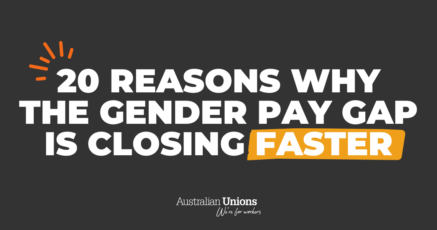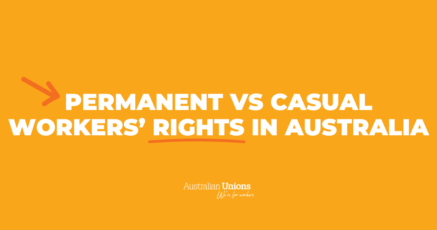What is more valuable than our children getting the best start in life?
Early childhood educators hold an incredibly important role in our society – they influence the future success and wellbeing of our youngest citizens, and provide essential respite to parents and families. The work they do allows the rest of the economy to keep ticking.
Yet early childhood educators are some of the lowest paid workers – some earn just $24 an hour despite being highly qualified, and carrying an enormous amount of responsibility.
Those who work in the sector are more than just carers or ‘babysitters’ – they are educators. Last week burnt out workers around the country walked off the job to be recognised as such, through better pay, conditions and respect.
They’re not just standing up for wages and conditions – they’re standing up for the value of early childhood education.
What is the value of early childhood education?
The first five years of a child’s life are a critical period in human brain development. More than two decades of research has shown that interactions between educators and children are pivotal for optimal child learning – around language development, behavioural expectations, and emotional relationships. The effects of early childhood education are seen as far as secondary school.
But the most skilled educators are leaving the sector; fed up with staff shortages, low pay and undervalued working environments.
When they leave, they take more than just skills and experience with them – the loss of good educators is felt emotionally by children who develop relationships with their teachers.
Early educator and United Workers Union (UWU) member Talie Mengell says, “It’s hard to carry on because there’s so many other jobs you could walk straight into and earn more money and potentially have more respect… that lack of respect feeds into the belief that it’s not worth being remunerated.”
Unsurprisingly, this lack of respect stems from the perception of early care work as a feminised skillset.
UWU Director of Early Education Helen Gibbons says, “This is something that has been characterised as women’s work… it’s undervalued and people are expected to do it for the love of it… early educators do love their jobs, but they work incredibly hard and are incredibly skilled and deserve to be paid properly.”
Poor working conditions have left childcare centres with limited places, and those workers who do stick around find their workloads mean they can’t provide high quality care and education to children. This leaves them with little time to focus on programming or professional development, leading to a lack of job satisfaction.
It’s not just workers that suffer from these shortfalls – it’s Australian families and children.
How would a pay rise change lives?
For starters, 60 per cent of workers that have left the sector say that higher pay would have changed their minds about staying. A pay rise would provide financial security to the 8 in 10 educators who find it difficult to cover an unexpected, emergency $400 expense.
A wage increase would make a massive difference to the 70 per cent of workers who live with constant anxiety about their financial situation and would help compensate for the unpaid hours that many workers are forced to do to make up for staff shortages and performing extra cleaning duties. Above all, it would make early childhood educators feel valued for the work they do.
Early childhood educators comfort our children, put them to sleep, teach them new skills, and set them on the course of the rest of their lives. They pour a huge amount of emotional and intellectual labour into their jobs – and they deserve to be compensated for it so they can continue to do the work they love.
The industrial action took place last week because workers came together in their union to improve their workplaces for everyone.
Union membership is so much more than just individual protection – it’s about being part of a movement that drives positive change in the workplace and broader society.
If you want to see the same kind of passion and make positive change happen at your workplace, join your union today.






SHARE:
Compensating early educators critical for Australia’s future